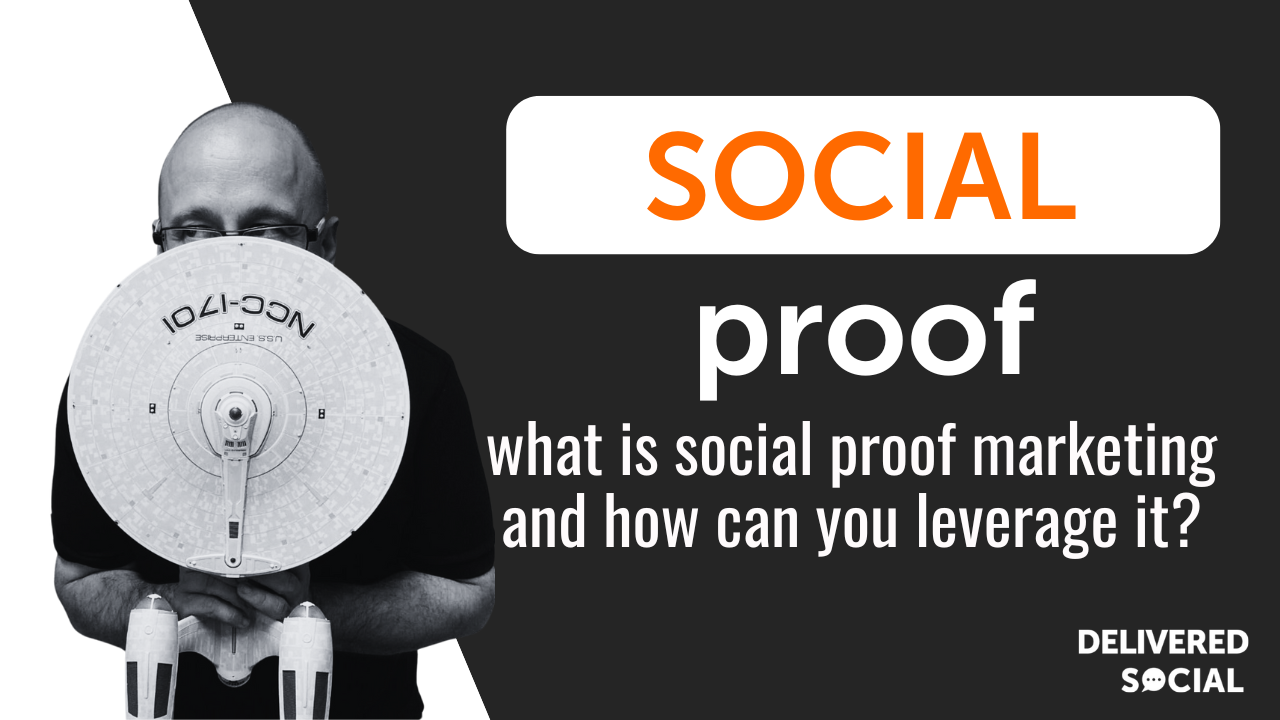
Social proof is a term coined by Robert Cialdini in 1984. But, in 2020, it's used to describe how conveying social influence can inspire individuals to take a certain action. In other words, how people follow and are influenced by the actions and decisions of the majority.
If a large number of people act in a certain way, others assume it's the right way to do things. Picture this; you're at a festival and you fancy grabbing something to eat. There are two street food vendors in front of you – one has a queue of 10 people, the other has none – which one would you choose?
Most people would join the queue for the busier food vender because they'll assume it's popular for a reason (e.g. good food), and the other is unpopular because the food is bad, or people have had a poor experience. We tend to conform to the majority, even if we think the decision is wrong and especially if we don't know whether it's right.
Plenty of experiments show how a majority can sway people into making certain decisions. One of the most famous studies is Solomon Asch's 1951 conformity experiment where 32% of participants conformed with the incorrect majority all of the time, and 75% of participants conformed at least once.
But what does all this have to do with marketing and how can your business benefit from learning more? That's what we're here to discuss.
What has Social Proof got to do with Digital Marketing?
After throwing a lot of psychology and jargon at you, you may be wondering what relevance social proof has to digital marketing. We know that social proof is effective in the 'real world', but can it be as effective online?
Social proof maybe even more effective in the digital world. If you're shopping for a specific product in a physical store, you can touch the product, in some cases try it out, and gain a good physical grasp of it. However, you can't do this online, so you are even more reliant on other people's opinions compared to offline shopping.
How many times have you checked out the reviews of a product before committing to purchase? Probably a lot, right? You could find the perfect toaster on Amazon in the right colour, but if 70% of people said they didn't like the product, you would probably conform to the majority and abandon your cart.
Types of Social Proof
According to Buffer, there are six types of social proof:
- Expert: If an expert in a particular industry recommends a product, more people will buy that product compared to one with no recommendation. If you're looking to boost your own social proof marketing, an expert recommendation is a fine way to get results.
- Celebrity: Celebrity endorsements go a long way in the digital world. As an Instagram user, if you saw your favourite celebrity endorsing a product, you'll probably gain immediate trust in the product and go in search of it (I'm a sucker for this).
- User: User social proof is when people who have used a product or service recommend it. These often come in the form of positive reviews or mentions on social media.
- Crowd: If a large group of people endorse a brand or product, consumers will likely follow in their footsteps and be more inclined to purchase.
- Friends: People trust their friends, so if a friend recommends a product or writes a positive review about it, their friends will likely follow, often having a snowball effect.
- Businesses can encourage this by making it easy for customers to leave feedback, whether through online reviews or a digital guest book, which collects testimonials in a way that feels personal and engaging.
- Certification: Certified products and services offer a 'seal of approval' for consumers. If, for example, a social media marketing course is certified by Facebook, you're more likely to buy it than one that isn't.
[code_snippet id=6]
Ways to Get Results with Social Proof Marketing
There are plenty of ways your business can achieve solid results with social proof marketing. Some methods are a little more 'out there' than others, some may take a lot of time, but it's ultimately down to you to put the effort in to get the results you deserve.
Numbers
In digital marketing, numbers can do a lot of the talking for you. I see so many businesses make use of this social proof method, and it really does work. Shout about how much money you've saved your customers, the number of people signed up to your product or the number of social media followers you have.
The web hosting industry is a big believer in numbers-based social proof marketing. Take Hostinger for example, who is one of the best cheap WordPress hosting providers around in 2020. Their homepage includes the powerful social proof number '15,000 signups every day'. If you're choosing a web host and one boasts thousands of signups per day, you'd be keen to buy, right? So dust off your best numbers and display them on your website or social media pages.
Ratings
Ratings are a great way to increase social proof. As we already know, if lots of people recommend a product or service, others tend to follow. One of the main industries we see ratings used is in the travel and accommodation sector. If lots of people recommend a hotel, that hotel will likely get more bookings than one with few or poor reviews.
Take Expedia for example, would you book a room with a hotel that has received great or excellent reviews, or one that has received average or bad reviews? Most consumers will conform with the majority, believe other guests' experiences, and book the widely-loved hotel.
Visual Proof
Photos and videos are extremely powerful social proof. Consumers are more likely to believe a claim if they can see it. Offering visual proof of a product's results is a great way to build trust. Especially if your product or service is meant to change the way a person looks or feels.
Skincare products, hair care products and more, use visual social proof in their marketing. For example, Skincity shows off plenty of before and after photos on their product pages. Consumers are more likely to buy after seeing how their skincare range has changed other customer's looks than if they were relying on a company-produced product description alone.
QuickFire Tips and Tricks
- Highlight: If you have a blog, make sure you enable features like comments, upvotes, views, etc. so you can show off your stats
- Mentions: Have a product that's been mentioned in the media or endorsed by a celebrity? Share, share, and share again
- Incentives: Offer your customers incentives for leaving feedback or writing reviews (positive and negative), e.g.10% off their next purchase
- Testimonials: If your customers have good things to say about your product or service, advertise this by placing testimonials on your website
- Milestones: Share milestones with your followers, e.g. reaching X amount of users, downloads, followers, etc.
- Influencers: Influencer marketing is very profitable and popular on social media. Influencers advertise your products and receive incentives like payments or discounts in return
- Recognition: If your brand or business has achieved an award, recognition, or even worked with other popular companies, advertise this on your website
Hopefully, we've opened your eyes to the benefits of social proof marketing. The beauty of this marketing approach is that it's versatile. Apply social proof to your website, social media, emails, landing pages etc. and you'll not only remind existing customers why they've chosen your brand but also inspire future customers to buy from you. So, have confidence that you can build trust and continue to build your brand using social proof marketing in 2020 and beyond.
Interested In Working Together?
Introducing Delivered Social. We're The Most-Rated Digital Agency In Surrey & Hampshire – We've Got To Be Doing Something Right.
Delivered Social is a digital marketing agency with one mission—to help businesses grow. We're famous in Guildford and Portsmouth for our social clinics. We believe in free advice. We build lasting relationships because our team prides itself on being helpful, which our clients appreciate.
If you are looking for a new website or an agency to manage your social media presence, we can help.
If you need something slightly different, here's a super handy list of all our services, or you can always email us.


























